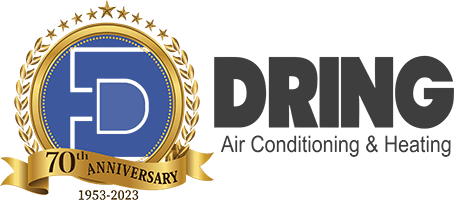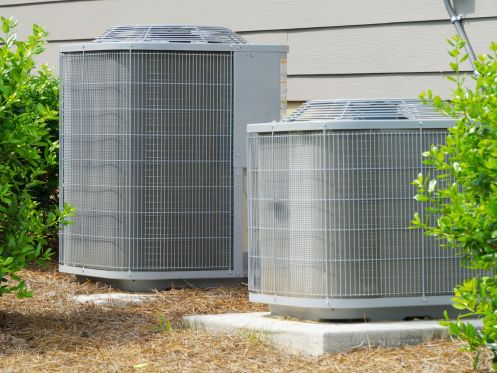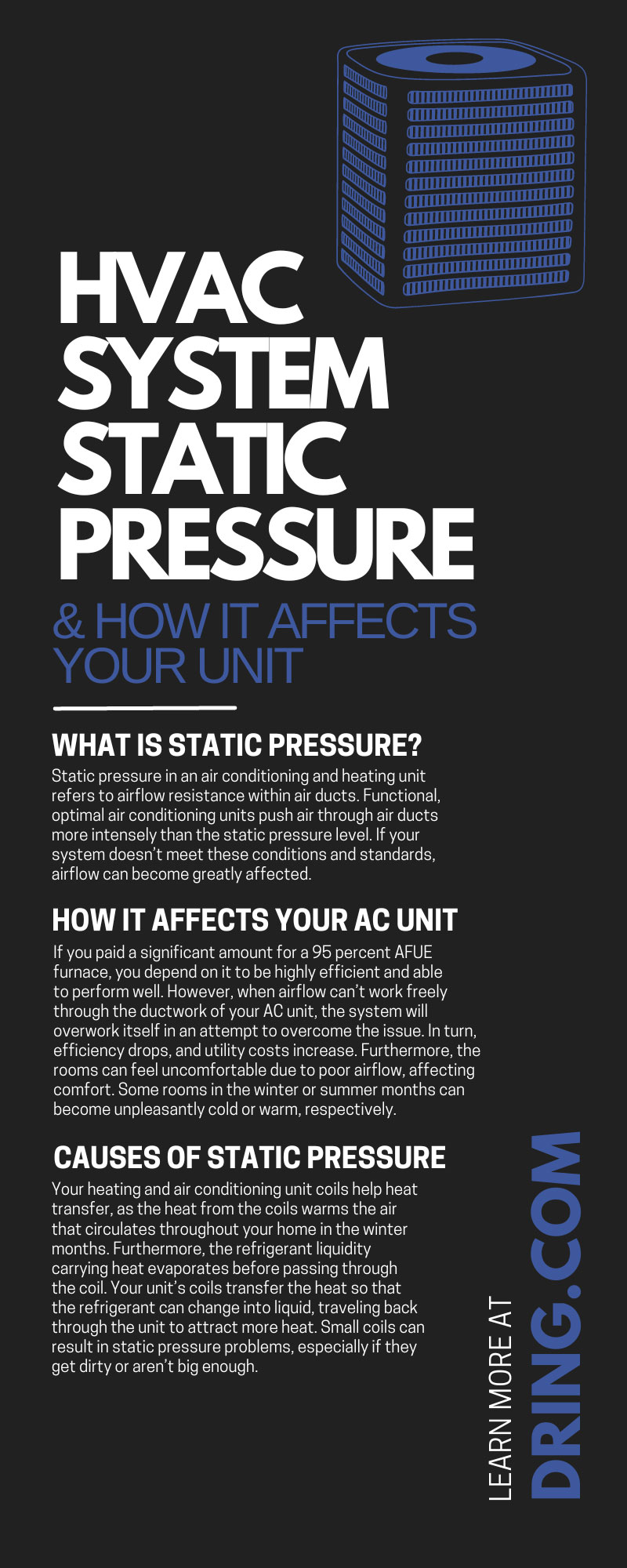When an HVAC (Heating, Ventilation, and Air Conditioning) system starts behaving irregularly, the issue could stem from high static pressure. Read through this overview of HVAC system static pressure to better understand how it can affect your unit.
What Is Static Pressure?
Static pressure in an air conditioning and heating unit refers to airflow resistance within air ducts. Functional, optimal air conditioning units push air through air ducts more intensely than the static pressure level. If your system doesn’t meet these conditions and standards, airflow can become greatly affected.
Your heating and cooling system distributes conditioned air by relying on ductwork. Without an efficient duct system, your heating and cooling unit can’t heat or cool your residence as it typically should. Sufficient air ducts allow for even temperature control and consistent airflow throughout the space. As long as indoor air circulates properly, you’ll likely have clean, comfortable air in every room.
How It Affects Your AC Unit
There are various ways static pressure can affect your AC unit. Firstly, it can affect the unit’s efficiency—the more static pressure your AC unit has, the less efficiently your system will perform. Imagine that if the AC condenser or the furnace were the heart of the unit, the ductwork would be the veins. If air can’t travel through, then the system wouldn’t work.
If you paid a significant amount for a 95 percent AFUE furnace, you depend on it to be highly efficient and able to perform well. However, when airflow can’t work freely through the ductwork of your AC unit, the system will overwork itself in an attempt to overcome the issue. In turn, efficiency drops, and utility costs increase. Furthermore, the rooms can feel uncomfortable due to poor airflow, affecting comfort. Some rooms in the winter or summer months can become unpleasantly cold or warm, respectively.
Causes of Static Pressure
So, what are some causes of static pressure? Let’s review how small, dirty coils, undersized air returns, and restricted, clogged air filters can negatively impact your air conditioning and heating unit.
Small or Dirty Coils
Your heating and air conditioning unit coils help heat transfer, as the heat from the coils warms the air that circulates throughout your home in the winter months. Furthermore, the refrigerant liquidity carrying heat evaporates before passing through the coil. Your unit’s coils transfer the heat so that the refrigerant can change into liquid, traveling back through the unit to attract more heat. Small coils can result in static pressure problems, especially if they get dirty or aren’t big enough.
Small or dirty coils can result in heat resistance, similar to dirtied filters. Additionally, dirty system coils containing dirt, dust, and debris can restrict airflow within the unit and ductwork, causing your unit to work harder and potentially break down.
Restricted, Clogged Air Filters
It’s crucial for your air conditioning and heating unit to have clean filters. These filters promote optimal airflow and temperature regulation throughout your home, business, or facility. Air filters specifically act as screens filtering our pollutants, such as dust, allergens, and dirt, preventing them from circulating through air vents and ductwork. As air continuously passes through AC unit filters, the mesh traps particles.
When working properly, this build-up of particles shouldn’t become an issue. However, failure to replace the air filter after several months can result in clogging and restricted airflow. This problem can cause the unit to work harder than it should. Prevent air conditioning and heating unit issues by investing in filters with higher MERV ratings. You can also perform scheduled filter changes to promote your unit’s operation and functionality without fear of your system breaking down prematurely.
Undersized Air Returns
Undersized or poorly designed ductwork can result in increased static pressure. Furthermore, undersized air intake returns can also promote static pressure issues. Air return ducts draw in air from various rooms and send it back to your heating and cooling system. With undersized air returns, your AC unit blower motor has difficulty pulling air into the unit, preventing proper circulation.
Undersized air returns are more apparent after installing new AC unit equipment or sealing and repairing air ducts. Furthermore, undersized air returns involve circulating air conditioning refrigerant throughout your unit in a closed loop. A lack of return air can throw off the refrigerant loop, causing major problems such as system breakdowns and expensive repairs.
Signs of High Static Pressure
There are several common signs of high static pressure and many ways to alleviate it. Symptoms of high static pressure, including spotty or inconsistent airflow, decreased air quality, and noisy air conditioning units, can account for improper AC unit functionality.
Spotty, Inconsistent Airflow
The goal of a functional AC and heating unit is to maintain consistent temperatures throughout your home, office, or facility. As such, one sign of high static pressure is spotty or inconsistent airflow in the feel of different rooms. With high static pressure, heating may occur in only one room, or cool air may come out of only one end of the outlet.
This problem can create hot and cold spots, making it feel less comfortable no matter where you are in the residence. Monitor your static pressure, airflow, coil size, and other factors for proper flow and temperature regulation.
Decreased Air Quality
Another cause of high static pressure in your AC unit can come from decreased indoor air quality. Because the problems lead to restricted airflow, warm air will have a higher chance of carrying air contaminants, allergens, and dust throughout the home. If airflow passes through a restricted path or dirtied air filter, it can bring pollutants into the next room.
Ensure that you clean your air ducts and vents and replace air filters regularly to ensure air quality. High static levels can substantially decrease air quality, so staying on top of regular AC unit care and maintenance is essential.
Noisy Air Conditioning Unit
While a normal air conditioning and heating unit emits some noises, it’s usually subtle or quiet. However, a heating and cooling system producing loud mechanical noises can create stress and frustration, and the sounds may be due to high static pressure. The noises stem from air moving through your unit’s return grill, ducts, and vents faster than usual.
Because of decreased airflow, the blower motor works much harder to push air through, resulting in loud, excessive noises. So, if you hear unusual sounds from your AC unit, it’s likely from the blower motor working at maximum power. Addressing the sound is crucial—you want to call a professional before your AC unit needs hefty repairs or replacement.
Dring specializes in air conditioning and heating system repairs and replacements. We operate in residential and commercial locations in the Carrollton, TX, area. Our AC maintenance services involve our skilled technicians that focus on performance, longevity, and efficiency in your unit. For more information, contact our team today.








